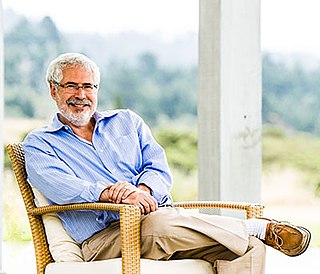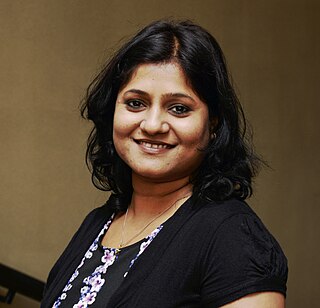Related Research Articles
A startup or start-up is a company or project undertaken by an entrepreneur to seek, develop, and validate a scalable business model. While entrepreneurship includes all new businesses including self-employment and businesses that do not intend to go public, startups are new businesses that intend to grow large beyond the solo-founder. During the beginning, startups face high uncertainty and have high rates of failure, but a minority of them do go on to become successful and influential.

Venture capital (VC) is a form of private equity financing provided by firms or funds to startup, early-stage, and emerging companies, that have been deemed to have high growth potential or that have demonstrated high growth in terms of number of employees, annual revenue, scale of operations, etc.. Venture capital firms or funds invest in these early-stage companies in exchange for equity, or an ownership stake. Venture capitalists take on the risk of financing start-ups in the hopes that some of the companies they support will become successful. Because startups face high uncertainty, VC investments have high rates of failure. Start-ups are usually based on an innovative technology or business model and they are often from high technology industries, such as information technology (IT), clean technology or biotechnology.
A business incubator is an organization that helps startup companies and individual entrepreneurs to develop their businesses by providing a fullscale range of services, starting with management training and office space, and ending with venture capital financing. The National Business Incubation Association (NBIA) defines business incubators as a catalyst tool for either regional or national economic development. NBIA categorizes its members' incubators by the following five incubator types: academic institutions; non-profit development corporations; for-profit property development ventures; venture capital firms, and a combination of the above.

Y Combinator Management, LLC (YC) is an American technology startup accelerator and venture capital firm launched in March 2005 which has been used to launch more than 4,000 companies. The accelerator program started in Boston and Mountain View, expanded to San Francisco in 2019, and was entirely online during the COVID-19 pandemic. Companies started via Y Combinator include Airbnb, Coinbase, Cruise, DoorDash, Dropbox, Instacart, Reddit, Stripe, and Twitch.
A social enterprise is an organization that applies commercial strategies to maximize improvements in financial, social and environmental well-being. This may include maximizing social impact alongside profits for co-owners.

Jean Case is an American businesswoman, author, and philanthropist who is chair of the board of National Geographic, CEO of Case Impact Network, and CEO of the Case Foundation. She is married to AOL co-founder Steve Case.

Steve Blank is an American entrepreneur, educator, author and speaker based in Pescadero, California.
An angel investor is an individual who provides capital to a business or businesses, including startups, usually in exchange for convertible debt or ownership equity. Angel investors often provide support to startups at a very early stage, once or in a consecutive manner, and when most investors are not prepared to back them. In a survey of 150 founders conducted by Wilbur Labs, about 70% of entrepreneurs will face potential business failure, and nearly 66% will face this potential failure within 25 months of launching their company. A small but increasing number of angel investors invest online through equity crowdfunding or organize themselves into angel groups or angel networks to share investment capital and provide advice to their portfolio companies. The number of angel investors has greatly increased since the mid-20th century.
Entrepreneurship is the creation or extraction of economic value in ways that generally entail beyond the minimal amount of risk, and potentially involving values besides simply economic ones.

The Meltwater Entrepreneurial School of Technology (MEST) is an Africa-wide technology entrepreneur training program, seed fund, and incubator headquartered in Accra, Ghana. The three-phased institution was founded in 2008 to provide training, investment, and mentoring for aspiring technology entrepreneurs with the goal of creating globally successful companies that create wealth and jobs locally in Africa.

Jane Marie Chen is the co-founder of Embrace, a social enterprise startup that produces a low-cost infant warmer, that gives premature and low-birth-weight infants a better chance at survival.

Sumaya Kazi is an American entrepreneur. At the age of 23, Kazi founded her first company The CulturalConnect. She later founded and was the CEO of San Francisco-based technology company Sumazi, a social intelligence platform used by brands, celebrities and enterprises. Kazi held one of the first social media management positions at a Fortune 500 company leading social media at Sun Microsystems until its acquisition by Oracle.

An organizational founder is a person who has undertaken some or all of the formational work needed to create a new organization, whether it is a business, a charitable organization, a governing body, a school, a group of entertainers, or any other type of organization. If there are multiple founders, each can be referred to as a co-founder. If the organization is a business, the founder is usually an entrepreneur. If an organization is created to carry out charitable work, the founder is generally considered a philanthropist.

Kunal Bahl is an Indian technology entrepreneur and investor.

Vani Kola is an Indian venture capitalist. She is the founder and managing director of Kalaari Capital, an Indian early stage venture capital firm. She was listed as one of the most powerful women in Indian business by Fortune India in 2014.

Neelam Pol is an entrepreneur and founder of Khel Planet Foundation. She is a Harvard University alumna and lives in Mumbai.
York Entrepreneurship Development Institute (YEDI) is a venture fund, startup accelerator, incubator and entrepreneurial community located within York University in Toronto, Ontario, Canada. YEDI facilitates collaboration between students, alumni, and academic and business leaders. The organization was founded in 2013 by businessman Dr. Marat Ressin, a native of Russia with close ties to the Jewish community in Canada.

Entrepreneurs Roundtable Accelerator is an American seed accelerator launched in January 2011.
Rheaply, Inc. is a privately held B2B Software as a service company that specializes in enterprise asset management technology for the circular economy. The company markets resource exchange technology to improve asset recovery outcomes and internal reuse of physical assets within large organizations. Rheaply operates a progressive web application for resource management in higher education, government, enterprise, biopharma, built environment and retail organizations. The company is located in Chicago, Illinois.

CIIE.CO is an Indian startup accelerator and incubator that supports early-stage startups located at IIM Ahmedabad in Ahmedabad, India. It was founded in 2002 to promote innovation and entrepreneurship in India. It is a Center of excellence set up at Indian Institute of Management Ahmedabad with support from the Government of India's Department of Science and Technology and the Government of Gujarat.
References
- ↑ Greathouse, John. "Do You Have 'Founderitis'? In Denial? Check Out These 7 Symptoms". Forbes. Retrieved 2021-03-10.
- ↑ Kleibrink, Maryll (December 2004). "Diagnosis: Founderitis". Executive Update. ASAE. Retrieved 24 May 2011.
- ↑ Adler, Carlye (8 May 2007). "Time to replace yourself". CNN Money. CNN. Retrieved 24 May 2011.
- 1 2 "Surviving Founder's Syndrome". National Resources Centre. Archived from the original on 2008-12-24. Retrieved 2008-11-22.
- ↑ "Founder's Syndrome". BoardSource. Retrieved 2019-03-26.
- ↑ Block, Stephen (June 2002). "Toward an Understanding of Founder's Syndrome: An Assessment of Power and Privilege Among Founders of NonProfit Organizations". Nonprofit Management and Leadership. 12 (4): 353–368. doi:10.1002/nml.12403 – via ResearchGate.
- ↑ Patel, Neil. "90% Of Startups Fail: Here's What You Need To Know About The 10%". Forbes. Retrieved 2021-03-10.
- 1 2 Ceaser, Donovon Keith (2018-10-02). "'Because the ego started to grow bigger than the project itself': a case study of founder's syndrome on an educational community of practise". Ethnography and Education. 13 (4): 459–476. doi:10.1080/17457823.2017.1384321. ISSN 1745-7823. S2CID 148925154.
- ↑ "WeWork and the dangers of founder ego". www.managementtoday.co.uk. Retrieved 2019-09-26.
- 1 2 3 "Rediagnosing "Founder's Syndrome": Moving Beyond Stereotypes to Improve Nonprofit Performance". Non Profit News | Nonprofit Quarterly. 2019-03-07. Retrieved 2019-03-26.
- 1 2 3 Shah, Dave (2018-05-18). "3 Signs the Best Move for Your Business Is to Hire Somebody Else to Run It". Entrepreneur. Retrieved 2018-08-24.
- ↑ Clifford, Catherine (2018-11-05). "Elon Musk: 'You're gonna go a little bonkers if you work 120 hours a week'". CNBC. Retrieved 2021-03-10.
- ↑ Shaw, Robert B. (2020). All in : how obsessive leaders achieve the extraordinary. [New York, New York]. ISBN 978-1-4002-1220-0. OCLC 1162784081.
{{cite book}}: CS1 maint: location missing publisher (link) - ↑ Pells, David. "All In". PM World Journal. Retrieved 2021-03-10.
- ↑ Organization, Entrepreneurs' (2020-02-21). "How to Cure Founder's Syndrome". Inc.com. Retrieved 2021-03-10.
- ↑ Furr, Nathan. "Why Confident Entrepreneurs Fail: The Overconfidence Death Trap". Forbes. Retrieved 2021-03-08.
- ↑ Zhang, Stephen X.; Cueto, Javier (May 2017). "The Study of Bias in Entrepreneurship". Entrepreneurship Theory and Practice. 41 (3): 419–454. doi:10.1111/etap.12212. ISSN 1042-2587. S2CID 146617323.
- ↑ Judkrue, A. (October 2010). "The transformational leadership factors influence global leaders". 2012 e-Leadership Conference on Sustainable e-Government and e- Business Innovations (E-LEADERSHIP). pp. 1–4. doi:10.1109/e-Leadership.2012.6524708. ISBN 978-1-4673-2980-4. S2CID 19675031.
- ↑ Comaford, Christine. "Jerry Yang, Reed Hastings, Mark Pincus and the Four Signs of Founderitis". Forbes. Retrieved 2021-03-10.
- ↑ "The Founder's Dilemma". Harvard Business Review. 2008-02-01. ISSN 0017-8012 . Retrieved 2021-03-10.
- ↑ "This SoftBank-Backed Startup Sought to Disrupt the Car Market. Instead, It Became a Poster Child for Disruption Gone Awry". Fortune. Retrieved 2021-03-20.
- ↑ Shukla, Vikas (2020-03-10). "SoftBank's top 10 worst startup investments". ValueWalk. Retrieved 2021-03-20.
- ↑ "Über den Lebenszyklus von Firmen". Avenir Suisse (in Swiss High German). Retrieved 2021-03-20.
- 1 2 "Founder's Syndrome? Who me?". Help4NonProfits. Retrieved 2008-11-22.
- ↑ Miller, Kelly (2019-07-25). "The Top 10 Marketing & Communications Mistakes Startup Founders Make — and How to Avoid Them". Medium. Retrieved 2019-08-18.
- ↑ "Beware: This Hippo Kills Your Company!". Corporate Rebels. 2018-12-06. Retrieved 2019-08-18.
- ↑ Silverberg, David (2017-04-20). "Why you need to question your hippo boss". BBC News. Retrieved 2018-08-24.
- ↑ Kromer, Tristan (2019-06-01). "The question index for real startups". Journal of Business Venturing Insights. 11: e00116. doi:10.1016/j.jbvi.2019.e00116. ISSN 2352-6734. S2CID 188822753.
- ↑ Adrenaline junkies and template zombies : understanding patterns of project behavior. Tom DeMarco. New York, NY: Dorset House Pub. 2008. ISBN 978-0-13-349228-6. OCLC 891469430.
{{cite book}}: CS1 maint: others (link) - ↑ "re:Work - Postmortem culture: how you can learn from failure". rework.withgoogle.com. 24 April 2018. Retrieved 2021-03-10.
- 1 2 "About re:Work". rework.withgoogle.com. Retrieved 2021-03-10.
- ↑ "Founder's Syndrome: How Corporations Suffer -- and Can Recover". Free Management Library. Retrieved 2008-11-23.
- ↑ Gerdeman, Diana (2018-07-17). "THE MOST SUCCESSFUL STARTUPS HAVE HANDS-ON FOUNDERS" . Retrieved 2018-07-28.
- ↑ Lebowitz, Shana. "Why Andreessen Horowitz bets on 'egomaniacal' and 'partly delusional' founders being the must successful". Business Insider. Retrieved 2019-08-18.
- ↑ "10 Startup Founders Tell Us: The Best Advice I've Ever Received". The Muse. 8 January 2014. Retrieved 2021-03-10.
- ↑ "Entrepreneurship and the Overconfidence Conundrum". 29 March 2019.